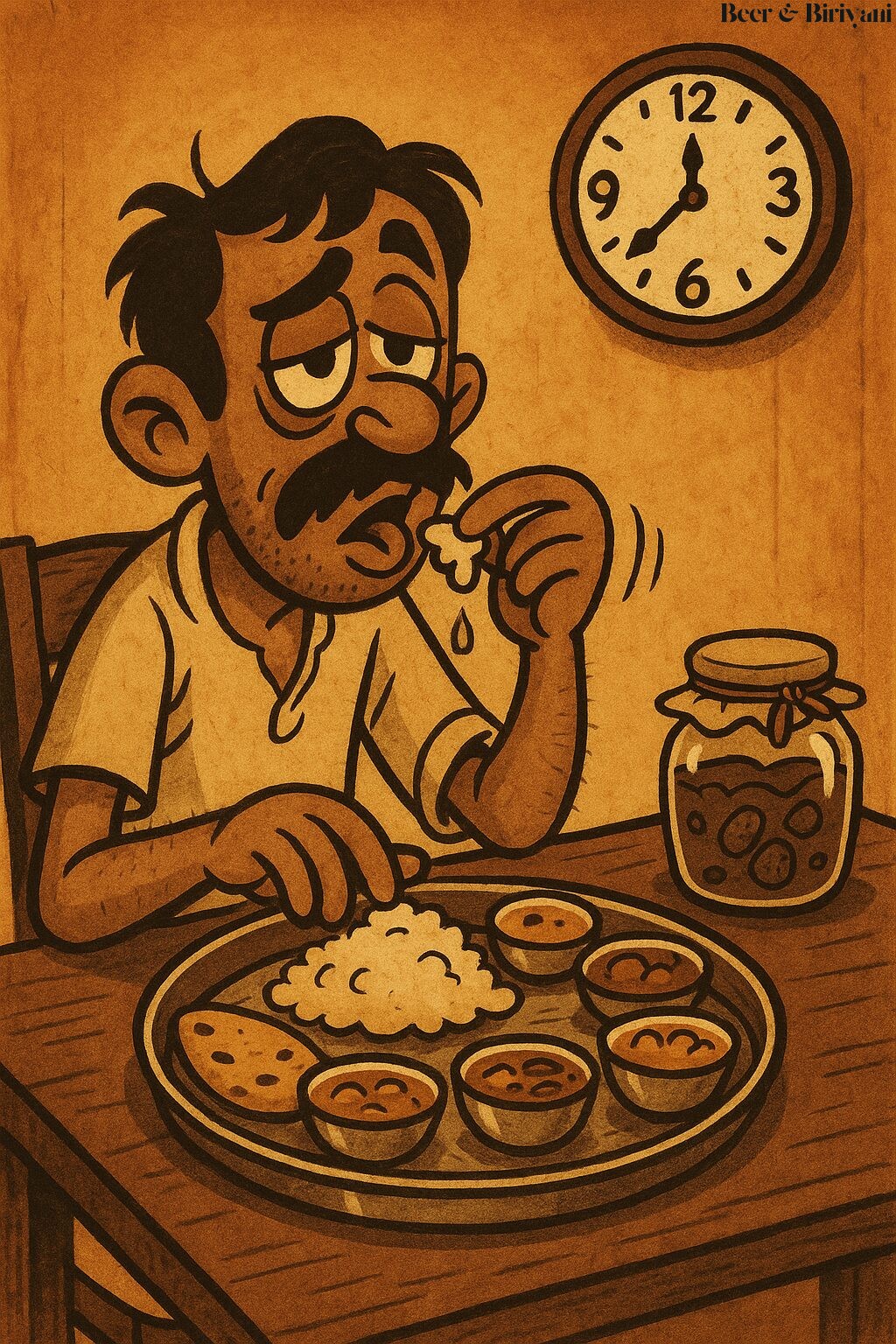There’s a very specific kind of sadness that comes from eating dal-chawal at 3 PM. It’s not about hunger. It’s not about taste. It’s about timing. Somehow, the same spoonful that felt like a warm hug at 1:15 feels like a half-hearted apology at 3. By then, the tadka has settled, the rice has cooled, and your appetite—bless its polite patience—has quietly walked out the door.
In my childhood home in Mumbai, meals had slots. Breakfast between 7 and 9. Lunch at 1, tea at 5, dinner by 8:30. Deviating from that wasn’t just unusual—it was unnatural. A meal too early made you feel like you were cheating. A meal too late made you question your life choices. Food wasn’t just about what you ate. It was when you ate it.
The Clock Inside the Curry
Indian food, especially home food, has a rhythm. Certain dishes just belong to certain hours. Upma at 8 AM is a comfort. Upma at noon? A misstep. Masala chai at 5 PM makes the world feel right. At 11 AM? It’s just confusing. And don’t get me started on eating idlis for dinner. That’s practically treason in some South Indian households.
These aren’t just habits. They’re emotional scripts. Each meal slot carries with it a mood, a memory, a particular kind of silence or conversation. Lunch at 1 PM means warmth, steam, and that first sigh of satisfaction. Push it to 3, and you’re left with fridge-chilled leftovers and a lingering sense that something slipped through the cracks.
Why 1 PM Matters
Historically, lunch in many Indian households was the main meal of the day. Freshly cooked. Eaten at home. Centered around rice, dal, sabzi, and often a small sweet to close. It wasn’t a grab-and-go affair. It was a ritual. Often consumed in silence or with light conversation. Plates washed, mouths rinsed, naps taken. Lunch wasn’t just fuel. It was a reset.
Even today, when I find myself eating a lovingly packed tiffin at 2:45 in an Austin office break room, I feel like I’m performing a scene out of sync. The dal tastes fine. The aloo-gobi is comforting. But the joy is muted. Like listening to your favorite song on half-volume.
Our Bodies Know
There’s also the biological side. According to Ayurveda and even modern science, the digestive fire—agni—is strongest at midday. That’s when your body is primed to digest a full meal. Delay it, and the body protests. You feel bloated, dull, or worse—emotionally off. Because your body isn’t just digesting food. It’s digesting time. And time, when mishandled, tastes stale.
The Ghost of a Missed Meal
There’s a particular memory that haunts me. I was 10, stuck in a school sports day that went longer than expected. By the time I got home, lunch was cold. My mother reheated the dal. The chapatis were rubbery. I ate quickly, but something felt wrong. It wasn’t the food. It was the hour. Lunch, as I had known it, had passed. What I had was a plate of food. What I didn’t have was lunch.
Since then, I’ve carried that emotional timestamp. Even now, if I miss a meal by more than an hour, the day feels slightly tilted. I’ll eat. I’ll function. But the internal calendar is skewed. Like arriving at a party when half the guests have already left.
Why We Still Try to Eat on Time
In our fast-moving lives—meetings, traffic, Zoom fatigue—it’s easy to treat mealtime as elastic. “I’ll eat when I can,” we say. And we do. But slowly, imperceptibly, the rhythm of food loses its song. The phulkas lose their puff. The rice loses its soul. And we lose the quiet pleasure of being in sync with something as simple, and profound, as the clock.
Bringing It Back
These days, I try to pause at 1 PM. Even if it’s a quick meal, I try to make it warm, present, timely. I sit at the table. I put my phone away. I try not to scroll while eating. I remember that food isn’t just sustenance. It’s punctuation. A comma in the chaos. A daily ritual that says: this is where you stop. This is where you reset.
And if lunch must be late, I do it with ceremony. I reheat everything properly. I put it on a plate, not a box. I say a quiet sorry to the clock and a quiet thank you to the rice. I eat slowly, and I forgive the day. Because while food timing may be sacred, grace matters more. Especially the kind you serve yourself.
Born in Mumbai, now stir-frying feelings in Texas. Writes about food, memory, and the messy magic in between — mostly to stay hungry, sometimes just to stay sane.












